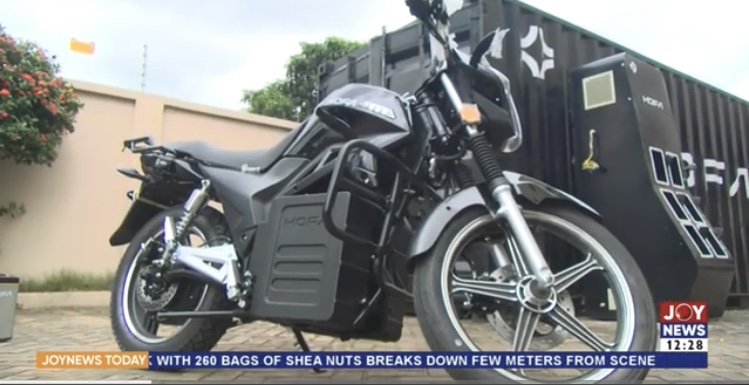
Audio By Carbonatix
In the bustling streets of Accra, a regular day unfolds with cars snarled in traffic and motorcycles deftly navigating the labyrinthine maze. Motorbikes seem to be everywhere you look, serving a multitude of purposes from deliveries to daily commutes. Yet, amid this vehicular symphony, a stark contrast emerges.
Many of these motorbikes are fossil fuel-consuming beasts, spewing out a noxious cocktail of pollutants into the air. However, quietly and efficiently, electric motorcycles are carving a path through this chaos, offering a clean alternative to their gas-guzzling counterparts.
The future is undoubtedly electric, but for those already entrenched in combustion engines, concerns range from the availability of charging infrastructure to efficient batteries, not to mention the specter of range anxiety.

Ida Mannoh, the VP of Marketing at KOFA Technologies, believes in bridging this gap. KOFA Technology's "Swap and Go" initiative is a game-changer for electric motorcycle enthusiasts. Here, riders can exchange their depleted batteries for fully charged ones in a matter of minutes, all while reducing harmful emissions.
“We wanted to move society from a fuel-dependent one to one that relies on efficient energy that is also safe for the environment. With our technology, we can build a solution that is more end-to-end, analogous to a petrol station," says Ida Mannoh.
For riders like Priscilla Afeli, the switch to an electric bike has brought significant improvements.
“The first time I saw an electric bike, I thought it was a toy until I sat on it. It was smooth, quiet. If I have to choose between this and the other fuel bikes, I’ll choose an EV bike 100 percent,” Priscilla enthuses.
Ghana has ambitious goals, aiming to achieve net-zero emissions by 2025. Studies reveal that, on average, a motorbike produces 119.6g of CO2 per kilometer, assuming a single rider. Adding more riders increases weight, making the engine work harder and emit even more CO2. Electric bikes are poised to be a real game-changer in this regard.
While electric motorbikes currently represent a small fraction of the two-wheeled vehicles on Accra's streets, they are paving the way for a cleaner, quieter, and more accessible urban future. The future of urban transportation is electric, and it's not just a dream. It's the silent revolution of electric motorcycles, changing the way we move through our cities, one ride at a time.
*****
"This story was a collaboration with New Narratives. Funding was provided by the Clean Air Fund."
Latest Stories
-
Ghana is rising again – Mahama declares
42 minutes -
Firefighters subdue blaze at Accra’s Tudu, officials warn of busy fire season ahead
1 hour -
New Year’s Luv FM Family Party in the park ends in grand style at Rattray park
1 hour -
Mahama targets digital schools, universal healthcare, and food self-sufficiency in 2026
1 hour -
Ghana’s global image boosted by our world-acclaimed reset agenda – Mahama
2 hours -
Full text: Mahama’s New Year message to the nation
2 hours -
The foundation is laid; now we accelerate and expand in 2026 – Mahama
2 hours -
There is no NPP, CPP nor NDC Ghana, only one Ghana – Mahama
2 hours -
Eduwatch praises education financing gains but warns delays, teacher gaps could derail reforms
2 hours -
Kusaal Wikimedians take local language online in 14-day digital campaign
3 hours -
Stop interfering in each other’s roles – Bole-Bamboi MP appeals to traditional rulers for peace
3 hours -
Playback: President Mahama addressed the nation in New Year message
4 hours -
Industrial and Commercial Workers’ Union call for strong work ethics, economic participation in 2026 new year message
6 hours -
Crossover Joy: Churches in Ghana welcome 2026 with fire and faith
6 hours -
Traffic chaos on Accra–Kumasi Highway leaves hundreds stranded as diversions gridlock
6 hours

